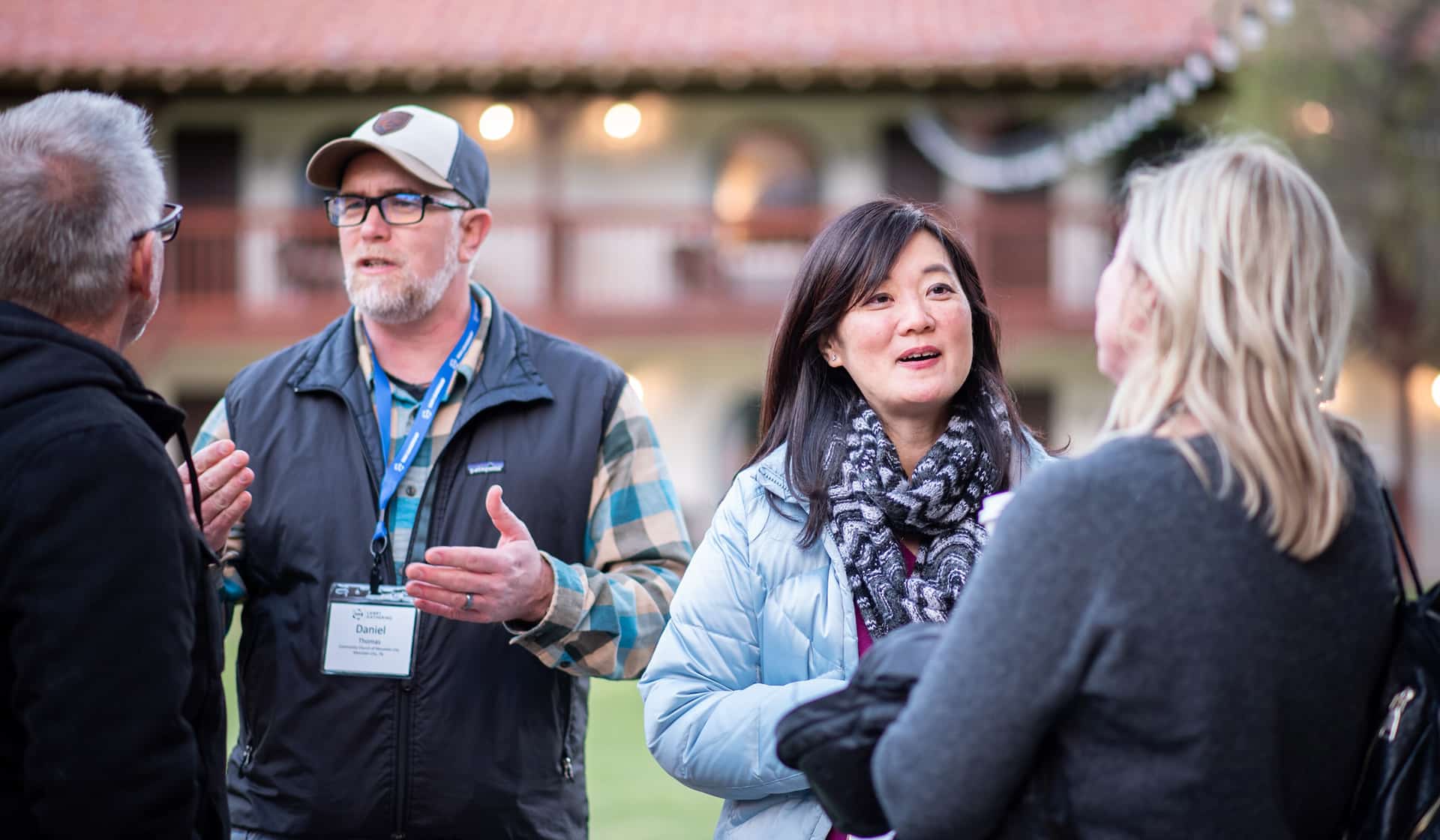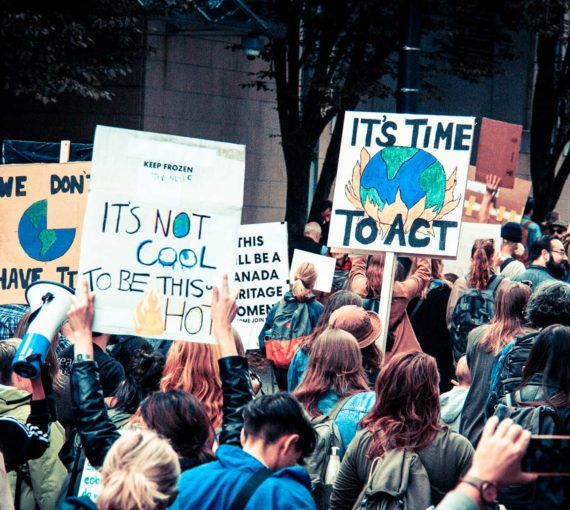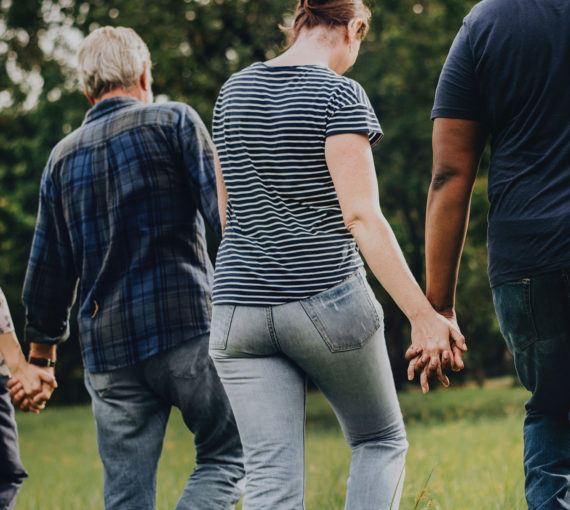
The global community is coming together for the common good of the whole planet. Let’s stay positive and healthy while maintaining our commitment to nature and collective well-being. (Photo: Small Group Network)
These are extraordinary times.
We’re living the legacy of Canada’s colonial, capitalist and patriarchal history though the climate and biodiversity crises, a global pandemic, truth and reconciliation with Indigenous Peoples, economic instability, growing inequalities and political polarization.
But we are nature — all people and all species. This means we’re all interconnected with one another and with the biosphere that sustains us. What we do to the planet and to each other, we do to ourselves.
For Earth to continue to be habitable for humans, we must change the way we live and how we think about our place in the natural world.
People helping each other to get through crises has happened everywhere on Earth throughout human history. What’s unprecedented today is that ours is now a global community coming together for the common good of the whole planet.
Be part of the millions acting together for climate, nature and community
FIVE WAYS TO STAY RESILIENT
1. Take care of your well-being
Everyone’s heard the plane takeoff safety announcement: “If you’re travelling with a child or someone who requires assistance, secure your mask first and then assist the other person.” If you don’t care for yourself first, how will you be able to take care of anyone else?
Here are a few suggestions to help.
Reconnect with nature
Crises ignite heightened fear and uncertainty. But scientists and researchers agree: time spent in nature makes us happier, healthier and less stressed.
Evidence shows that being regularly immersed in a natural setting, like a park, wetland or woodlot can reduce blood pressure, anxiety and stress levels and boost immunity. It even makes us nicer and more empathetic, with more meaningful relationships and increased community involvement.
- Learn lessons from nature. Practice stress-relieving strategies such as deep breathing, hot or cold baths, moon- and forest-bathing.
- Spend at least 30 minutes a day with nature. You can do One Nature Challenge activities anywhere. Savour the sunset from a window, listen for birdsong or dine alfresco!
- Encourage kids to go outside. Teach them about environmental responsibility too.
- Visit a Healing Forest. This nationwide network of green spaces is dedicated to reconciliation between Indigenous and non-Indigenous people and promotes health, healing and community.
Whatever you’re up to, always follow public health and safety guidelines.
Do less
Society puts pressure on people to always be productive, but it’s important to take time to process what’s going on and rest. Embrace moments of idleness. Remember, the Buddha didn’t reach enlightenment until he decided to stop doing!
Selective idleness can also be a climate solution. Slowing down and resting more can mean consuming less energy and fewer resources.
Seek help if you need it
If you or your loved ones are experiencing difficult challenges — emotional, physical, financial, legal or other — seek professional support. See if your employer or a local community service organization, such as a Neighbourhood House, community centre or cultural gathering place, offers assistance programs. Find information, resources and services at your local library.
2. Find hope in unexpected places
Grief, fear and injustice are woven into the harsh realities of a world in crisis. Advocating for change can be discouraging and demoralizing. But there are always reasons to have hope!
Learn from experience
While COVID-19 uprooted lives and caused death and devastation for millions, it also forced us to slow down and consider how we might learn to live healthily and sustainably. In his podcast, David Suzuki explored how the pandemic helped us refocus on what’s most important and rediscover our place on this beautiful living planet.
Whatever we go through, we can carry our learnings forward into the future.
Learn from others
Find hope in stories of people making a difference, such as those envisioning the climate-safer world they want and working to make it a reality. The Charged Up library features people working to build healthy, equitable, sustainable futures in communities throughout Canada.
Follow the science
Science and traditional knowledge always give new reasons to have hope!
Here are 10 promising developments in the climate justice movement showing how Canada can increase its climate ambition and do our fair share to limit global heating.
3. Build community
When life gets tough, it reminds us what’s most important — simpler ways of living and being surrounded by people who support us. It also ignites incredible acts of altruism, reinforcing a world where people take care of each other.
Get together with friends, family, roommates, neighbours, colleagues and others to find new, sustainable ways of living together, sharing resources and being in community that could better serve and benefit everyone in the long run.
Deepen connections
Making a difference is easy. Start by hosting a house meeting with those you live with. Connect over values you share and generate ideas of actions you can take together.
Then extend the invitation to others in your sphere. Host a block party, swap skills or start a food sharing club.
Here are 10 easy ways to start building community.
Practice listening
Transformational change requires mass mobilization. When people are tired and overwhelmed, their physical and mental health frays, their relationships weaken and they may long for connection. Listening can become a form of movement building.
Diversity, including of thought — even on contentious issues — is a strength. Practice seeing things from others’ perspectives. Learn that multiple truths can coexist. Admit when you’re wrong or that an alternative idea might work.
Our CliMate Chatbot draws on expertise in social and political psychology to help you navigate difficult conversations about climate change or any divisive topic. Listen with empathy, ask genuine questions and find shared values.
Join community-led movements
Many people just like you are working to secure a healthier, more viable future. Future Ground Network is a hub for local, grassroots groups to connect, build power, realize goals and be part of a growing movement of partners and allies creating socially and environmentally just communities. FGN provides free tools, resources, training and expertise, including on how to start a successful community-led initiative. Join an existing community group or start your own.
4. Prepare for emergencies
From heat waves to flash freezes, floods, forest fires, storms, droughts and smog, extreme weather events are a reality of a disrupted climate system.
Climate change and nature loss also destabilize resources and systems humans depend on for health and survival — water and food supply, transportation infrastructure, ecosystem services and the many industries that provide work. They also increase the risk of health complications and disease spread. All have social and economic impacts, particularly on marginalized and vulnerable people.
The Government of Canada provides information on what to do before, during and after a range of emergencies. Understand the risks in your area, create a household or group emergency plan and build an emergency kit.
Consume less
In today’s global society, wherever a crisis happens, effects may be felt far and wide. For example, supply chain issues can wipe out daily life necessities and inflate costs.
Find new ways to make the most of what you have and waste less. Reduce food waste by getting more creative with food scraps. Learn how to freeze food. Don’t confuse “best before” and “expired.” Make your own body care and cleaning products. Move toward a zero waste lifestyle. Adopt sustainable modes of transportation. Grow your own food.
Building these skills can benefit you in the long run!
Make home improvements
Whether you own or rent, steps to make your home sustainable now can also benefit you in the event of minor emergencies — and save you money! Get fossil fuels out. Boost energy efficiency. Find a good water filtration system. Improve indoor air quality. Retain indoor heat in winter. Stay cool in the summer.
5. Imagine a better world and nudge the system in that direction
Being resilient means acknowledging harms will continue and changing the larger system to reduce them.
Prepare for a paradigm shift. Current crises are rooted in extreme capitalism, colonialism and a lack of respect for nature. Solutions require insights from Indigenous Peoples, human creativity and a refocus on health, safety, equity and well-being.
Express yourself through art and storytelling
Beyond laws and policies, meeting the challenges of these times means accessing the full potential of human imagination, and listening to and lifting up diverse voices that can help get to the human heart of the issues and build movements.
Creative activities are powerfully healing. They help people express their passions, hopes and fears, and can catalyze transformational change.
Create works like those in our Art for Climate Justice campaign and Rewilding Arts Prize. Tell the story of your experience in a letter to the editor of your local newspaper. Sharing your perspective can help shift the needle on issues that matter most to you.
Mobilize for local action
Singer-songwriter Joan Baez said “Action is the antidote to despair.” Choices we (and decision-makers) make now will determine the severity of the impacts of a crisis. Take steps toward safeguarding a viable future for you and the people you care about: channel and transform your concerns and anxiety into political action.
Signing petitions is one way to influence politics.
People willing to work with local government leaders can make a bigger difference. This comprehensive online guide can help. It’s written for climate action but useful for many other issues.
Get politically active and vote
Your vote matters. Support leaders at all levels of government who understand the issues, take crises seriously and share your values. Push them to set evidence-based targets and implement clear plans to reach them.
Make sure you’re registered to vote and then get informed. Candidates’ positions on environmental and social issues vary widely. Research party platforms. Ask questions at town halls or debates. Let candidates know which issues matter to you.
Too young to vote? Encourage your class or school to join a student vote program that provides opportunities to take part in the election process. Talk to your parents about the importance of voting.



